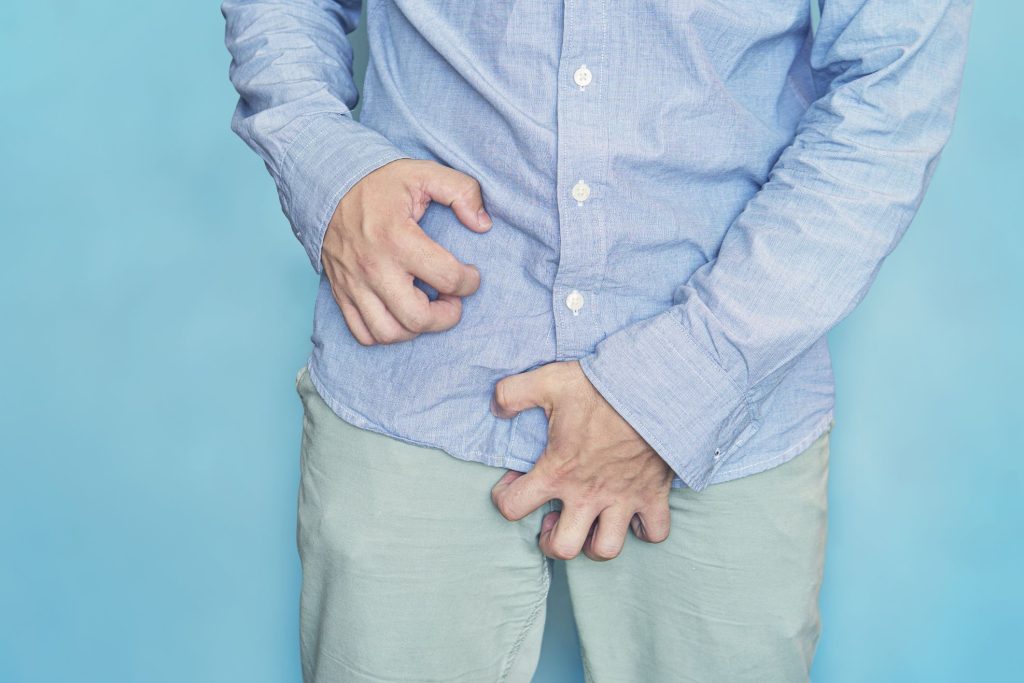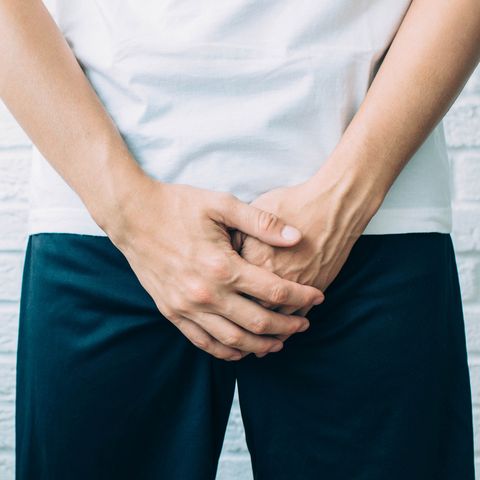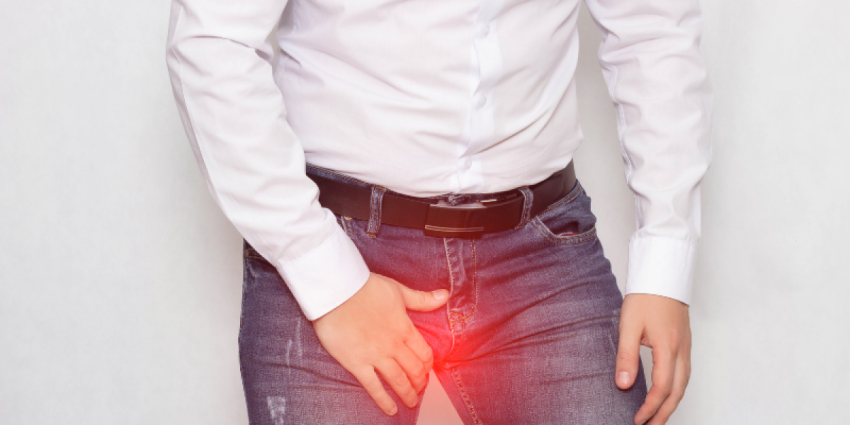Experiencing discomfort in your private area after going to the toilet can be worrying. There can be various potential reasons for this discomfort, including:
- Straining: Straining during a bowel movement can increase abdominal pressure, potentially affecting the genital area.
- Hemorrhoids: Swollen blood vessels in the rectum or anus (hemorrhoids) can cause discomfort, which may radiate to the testicular region.
- Infections: Infections in the urinary or reproductive system can lead to testicular pain.
- Prostate Issues: Prostate-related problems, like prostatitis, may lead to testicular discomfort
- Hernia: In some cases, an inguinal hernia might be a factor.
However, it’s essential to have a healthcare provider evaluate your specific situation to determine the underlying cause and recommend appropriate treatment.
When to See a Doctor If Your Balls Hurt?

Experiencing discomfort in the genital area after a bowel movement is a situation that shouldn’t be taken lightly.
While mild, occasional discomfort might not warrant immediate medical attention, there are certain circumstances in which it’s crucial to consult a healthcare professional
Persistent Discomfort
When you experience persistent discomfort that doesn’t improve or continues for an extended period, it’s a clear indication that something might be amiss. While minor discomfort can sometimes resolve on its own, prolonged or recurring discomfort should not be ignored.
It could be a sign of an underlying issue that requires professional evaluation and treatment. A healthcare provider can help identify the exact cause and offer guidance on managing the discomfort effectively.
Severe Pain
Experiencing severe or intolerable pain in the genital area following a bowel movement is a cause for immediate concern. Such intense pain can be indicative of a more serious problem, including conditions like infections, hernias, or other medical issues.
Seeking prompt medical attention is vital to address the severe pain and initiate appropriate treatment. Delaying treatment in cases of severe pain can lead to worsening symptoms and complications.
Fever or Infection Symptoms
If along with the genital discomfort you develop symptoms such as fever, chills, or signs of infection like increased redness, swelling, or discharge, it’s crucial to consult a healthcare professional without delay.
These symptoms suggest that an infection may be present. Ignoring infection symptoms can lead to the spread of infection and potentially more severe health issues. Prompt treatment can help manage and resolve the infection effectively.
Change in Urinary Habits
Any significant alteration in urinary habits, such as pain, difficulty urinating, frequent urination, or other urinary issues, should not be overlooked. Changes in urinary habits can be connected to the discomfort you’re experiencing and might signify an underlying problem.
Consulting a doctor is essential to assess both the urinary and genital issues comprehensively and ensure that the right treatment approach is taken.
Worsening Condition
Suppose you’ve attempted self-care measures, such as dietary changes to prevent straining, or over-the-counter pain relievers to manage mild discomfort, and your condition worsens despite these efforts. In that case, it’s a strong indication that professional evaluation is necessary.
This deterioration suggests that the root cause of your discomfort may require medical intervention. A doctor can conduct a thorough assessment, possibly order diagnostic tests, and recommend specific treatments or therapies to address the worsening condition effectively.
What Are The Common Causes Of Discomfort In The Genital Area?
Straining
Straining during a bowel movement is a common trigger for discomfort in the genital area. When you push too hard or bear down excessively while trying to pass stool, you increase the intra-abdominal pressure.
This heightened pressure can affect various structures in the pelvic region, including the genital area. Straining places added stress on the pelvic floor muscles and tissues, potentially leading to discomfort in the testicular region or lower abdomen.
Hemorrhoids
Hemorrhoids, often referred to as piles, are another frequent cause of discomfort. These are swollen blood vessels located in the rectum or anus. Hemorrhoids can be internal (inside the rectum) or external (around the anus).
During a bowel movement, especially if you strain, the pressure in the lower rectum and anus increases, potentially causing these blood vessels to swell further. This swelling can lead to pain, itching, and irritation in the affected area, which may extend to the testicles, adding to the overall discomfort.
Infections
Infections within the urinary or reproductive system can be a source of testicular discomfort after a bowel movement. These infections can occur due to various factors, including the presence of bacteria or other pathogens. Infections may lead to localized discomfort and pain in the genital area.
Symptoms such as burning during urination, increased frequency, and cloudy or bloody urine may accompany this discomfort. Seeking medical attention is essential to diagnose and treat the infection appropriately.
Prostate Issues
The prostate gland, a small gland located below the bladder in men, can be another factor contributing to discomfort. Prostate-related problems, such as prostatitis, involve inflammation or infection of the prostate.
When the prostate is inflamed or infected, it can lead to pain and discomfort. This discomfort may radiate from the lower abdomen to the testicles. Prostate issues can also be associated with urinary symptoms, such as increased urgency or frequency, making it important to consult a healthcare professional for proper evaluation and treatment.
Hernia
In some instances, an inguinal hernia might be the underlying cause of discomfort in the genital area following a bowel movement. An inguinal hernia occurs when a portion of the intestine protrudes through a weakened area in the abdominal wall, often in the groin region.
The pressure and discomfort generated by an inguinal hernia can extend to the testicular region, leading to pain and discomfort in that area. Hernias typically require surgical intervention to correct.
Can Home Remedies Reduce Testicular Discomfort?
Experiencing testicular discomfort can be distressing, but you can try these simple home remedies to ease mild discomfort
Rest and Elevation
When experiencing testicular discomfort, it’s important to provide relief by minimizing pressure and swelling. Lie comfortably and use a soft cushion or folded towel to gently elevate your scrotum. This reduces tension and strain on the testicles, which can alleviate discomfort. This position also encourages better blood circulation in the area.
Cold Compress
A cold compress can be an effective tool for reducing inflammation and soothing discomfort. To apply a cold compress, wrap some ice or a cold pack in a thin cloth or towel and place it on the affected area for about 15-20 minutes. The cold temperature constricts blood vessels, which can reduce swelling and provide relief. Always ensure that the cold pack is not in direct contact with the skin to avoid frostbite.
Over-the-Counter Pain Relievers
Over-the-counter pain relievers, such as ibuprofen (Advil) or acetaminophen (Tylenol), can help manage mild to moderate discomfort. These medications have anti-inflammatory and analgesic properties that can reduce pain and alleviate discomfort. It’s important to follow the recommended dosage instructions and consult a healthcare provider if you have any concerns or if the discomfort persists.
Supportive Underwear
Wearing supportive underwear is crucial for comfort and reducing friction. Opt for snug-fitting underwear, which can provide support and minimize movement. Loose-fitting or tight underwear may aggravate discomfort, so choose a supportive option.
Warm Baths
Warm baths can be relaxing and can help ease muscle tension in the pelvic area. Soaking in warm water can provide comfort and reduce discomfort. However, be cautious not to use hot water, as excessive heat can exacerbate discomfort. A warm bath can be particularly helpful if tension is contributing to the discomfort.
Hydration
Staying well-hydrated is a fundamental aspect of maintaining overall health. Proper hydration supports bodily functions, including those related to the urinary and reproductive systems. Adequate hydration can help with the management of discomfort and the prevention of issues related to dehydration.
Dietary Changes
If straining during bowel movements is contributing to your discomfort, consider making dietary changes to prevent constipation. Incorporate more fiber-rich foods like fruits, vegetables, and whole grains into your diet. Staying hydrated is also crucial, as it softens stool and makes bowel movements easier and less straining.
Avoiding Trigger Foods
Some individuals find that certain foods, such as spicy dishes or those containing caffeine, can exacerbate discomfort in the genital area. If you notice that specific foods trigger or worsen your discomfort, it’s advisable to identify and avoid them to reduce the likelihood of symptoms.
Gentle Exercises
Engaging in light exercises and stretches can promote blood flow in the pelvic region, which can help relieve muscle tension and discomfort. These exercises should be gentle and non-strenuous to avoid exacerbating any pain.
Mindful Rest
Rest is crucial for healing and recovery. Avoid activities that could worsen discomfort and allow your body to recuperate. Resting in a comfortable position with the scrotum elevated can be particularly beneficial.
Monitor Symptoms
Keeping a record of your symptoms and any changes is essential for your healthcare provider’s evaluation. This information can be valuable in diagnosing and treating the underlying cause of your discomfort.
How Can You Prevent Testicular Discomfort?

Preventing future testicular discomfort is essential for maintaining overall well-being. While it’s not always possible to completely avoid discomfort, there are several proactive steps and lifestyle changes you can implement to reduce the likelihood of experiencing testicular discomfort in the future. Here are some key prevention tips
Maintain Proper Hygiene: Good personal hygiene is essential to prevent infections and discomfort. Regularly wash the genital area with mild soap and water. Avoid using harsh or scented products that can irritate the skin.
Practice Safe Sex: Engage in safe sexual practices to reduce the risk of sexually transmitted infections (STIs), which can lead to testicular discomfort. Use condoms and ensure both you and your partner are regularly tested for STIs.
Avoid Overexertion: Overexertion during physical activities, especially strenuous exercise, can sometimes lead to testicular discomfort. Practice moderation and proper warm-up techniques to prevent strain.
Lift Safely: When lifting heavy objects, use proper lifting techniques to avoid straining the pelvic area. Bend at the knees and use your legs, not your back, to lift.
Manage Constipation: To reduce the likelihood of straining during bowel movements, maintain a diet rich in fiber and stay well-hydrated. Adequate fiber and fluids promote regular, comfortable bowel movements.
Stay Active: Engage in regular physical activity to promote blood flow and maintain muscle tone in the pelvic region. Staying active can help prevent muscle tension and discomfort.
Maintain a Healthy Weight: Excess weight can place pressure on the pelvic area, potentially leading to discomfort. Maintain a healthy weight through a balanced diet and regular exercise.
Stay Hydrated: Proper hydration is crucial for overall health and the prevention of urinary discomfort. Drink an adequate amount of water daily.
Supportive Underwear: Wear supportive, well-fitting underwear to minimize friction and provide adequate support to the testicles. Loose or overly tight underwear can lead to discomfort.
Regular Self-Examinations: Perform regular self-examinations of the testicles to check for lumps or abnormalities. Early detection of any issues can lead to prompt medical intervention if necessary.
Consult a Healthcare Professional: If you experience recurring discomfort, changes in urination, or other concerning symptoms, consult a healthcare provider for a comprehensive evaluation. Timely medical advice can prevent future issues.
FAQ
Why do my balls hurt the most?
Testicular pain can have various causes, including injury, infection, inflammation, or other medical conditions. The intensity of the pain depends on the underlying issue. If you’re experiencing severe testicular pain, it’s essential to seek medical attention promptly.
Why do my balls hurt when I edge?
Pain during sexual activities like edging can be attributed to a range of factors, including muscle tension or pressure on the testicles. It’s essential to listen to your body and stop any activity that causes pain or discomfort.
How often should a man release sperm?
There’s no specific frequency that applies to every man. It varies from person to person. Most men release sperm through ejaculation during sexual activities, but it’s not necessary to have a set schedule. It’s more important to have a healthy sexual relationship and not worry about a specific frequency.
How can I stop the pain in my balls?
Stopping testicular pain depends on its cause. If it’s due to a minor injury, rest and over-the-counter pain relievers might help. If the pain is persistent or severe, it’s important to consult a healthcare professional for a proper diagnosis and treatment.
Can too much sperm cause testicle pain?
No, the amount of sperm a man produces typically does not cause testicular pain. Pain in the testicles is more likely related to other factors such as injury, infection, or medical conditions.
How long do pain balls last?
The duration of testicular pain varies depending on the cause. Minor injuries or strains may resolve in a few days, while pain from infections or medical conditions may persist until they are properly treated. If you’re experiencing prolonged or severe testicular pain, consult a healthcare provider.
Can testicle pain be cured?
Whether testicular pain can be cured depends on its underlying cause. Many cases of testicular pain can be treated successfully, especially when the cause is identified and addressed. Seeking medical advice is essential to determine the appropriate treatment.
Should I ignore testicular pain?
No, testicular pain should not be ignored. While some cases might be due to minor issues, others can be signs of more significant problems, including infections or medical conditions. It’s crucial to consult a healthcare provider to determine the cause and receive appropriate treatment.
Why does my 1 testicle hurt?
Testicular pain in one testicle can result from various factors, such as injury, infection, inflammation, or medical conditions. The specific cause should be evaluated by a healthcare professional to provide a proper diagnosis and treatment.
How can I relieve testis pain naturally?
Natural methods for relieving testicular pain can include rest, over-the-counter pain relievers, cold compresses, and wearing supportive underwear. However, the effectiveness of these methods depends on the cause of the pain. Consulting a healthcare provider is advisable for persistent or severe pain.
Final words
In conclusion, experiencing testicular discomfort after a bowel movement can be unsettling, but it’s important to remember that various factors can contribute to this discomfort. While we’ve explored potential causes, home remedies, and prevention tips, it’s crucial to emphasize that if you’re dealing with persistent or severe discomfort, seeking professional medical advice is the best course of action.
Your health and well-being should always be a top priority, and healthcare professionals are there to provide the most accurate diagnosis and tailored guidance. In the end, the reasons behind this discomfort and being proactive in maintaining your health can help you live a more comfortable and worry-free life.

